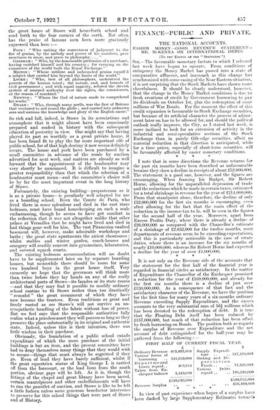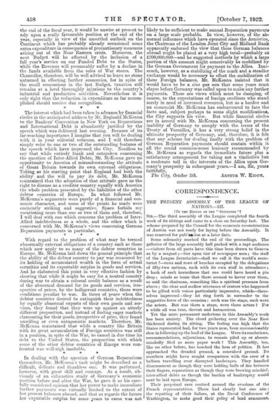F1NANCE—PUBLIC AND PRIVATE.
THE NATIONAL ACCOUNTS.
EASIER MONEY—GOOD REVENUE STATEMENT— MR. MeKENNA ON INTERNATIONAL DEBTS.
[To THE EDITOR or THE "SPECTATOR."] SIR,—The favourable monetary factors to which I referred last week have begun to operate. From conditions of stringency the Money Market has passed into a state of comparative affluence, and inasmuch as this change has synchronized with some easing of the Near Eastern situation, it is not surprising that the Stock Markets have shown more cheerfulness. It should be clearly understood, however, that the change in the Money Market conditions is due to fresh creations of credit by Government borrowing to pay its dividends on October 1st, plus the redemption of some millions of War Bonds. For the moment the effect of this credit expansion is favourable to Stock Exchange securities, but because of its artificial character the process of adjust- ment later on has to be allowed for, and should the political outlook really improve, the City, as I stated last week, is more inclined to look for an extension of activity in the industrial and. semi-speculative sections of the Stock Exchange than in purely Gilt-edge securities, albeit no material reduction in that direction is anticipated, while for a time prices, especially of short-term securities, will be favourably affected by easier monetary conditions.
I note that in some directions the Revenue returns for the past six months have been described as unfavourable because they show a decline in receipts of about £52,000,000. The statement is a good one, however, and the figures are encouraging. When framing his Budget, Sir Robert Home, allowing for the unparalleled depression of trade and the reductions which he made in certain taxes, estimated for a total shrinkage in revenue for the year of £214,000,000. From that standpoint alone, therefore, the decline of only £52,000,000 for the first six months is encouraging, even after allowing for the fact that the main effect of the reduction in the income-tax to 5s. will be seen in the figures for the second half of the year. Moreover, apart from Excess Profits Duty, where there is already a decline of £26,000,000 as compared with the Chancellor's estimate of a shrinkage of £2,652,000 for the twelve months, most departments of revenue seem to be exceeding expectations, and this is particularly noticeable in the case of estate duties, where there is an increase for the six months of nearly £10,000,000, whereas Sir Robert Horne had expected a decline for the year of over £4,000,000.
It is not only on the Revenue side of the accounts that the statement for the first half of the financial year is regarded in financial circles as satisfactory. In the matter of Expenditure the Chancellor of the Exchequer promised a reduction for the year of £169,000,000, and already for the first six months there is a decline of just over £150,000,000. As a consequence of that fact and the satisfactory character of the Revenue, we have the position for the first time for many years of a six-months ordinary Revenue exceeding Supply Expenditure, and the excess amounts to the very substantial sum of 56i millions which has been devoted to the redemption of debt. It is true that the Floating Debt itself has been reduced by £157,000,000, but much of that reduction has been offset by fresh borrowing on Bonds. The position both as regards the surplus of Revenue over Expenditure and the net amount of debt extinguished for the half-year may be gathered from the following :- FIRST HALF OF CURRENT FISCAL YEAR.
£ -
Ordinary Revenue 403,893,000 Supply
Expendi-
Various forms of
ture . . . . 317,424,000 borrowing .. 141,059,000 Sinking and De- Departmental
pre c in t• ion Loans repaid.. 8(0,CCO Funds .. .. 11,341,000 Taken from Ex-
Various Debts chequer balance 3,343,C00 repaid .. 190,290,000
£549,095,000
£549,655,000 Revenue Surplus
..*4,
£56,469,000
In view of past experience when hopes of a surplus have been dashed by large Supplementary Estimates towards the end of the fiscal year, it would be unwise at present to rely upon a really favourable position at the end of the year, especially in view of the unsettled outlook on the Continent which has probably already occasioned some extra expenditure in consequence of precautionary measures arising out of the Near Eastern crisis. Moreover, the next Budget will be affected by the inclusion of a full year's service on our Funded Debt to the States, while the Revenue will presumably suffer by a decline in the funds available from the sales of War stores. The Chancellor, therefore, will be well advised to leave no stone unturned in effecting further economies, for in spite of the small concessions in the last Budget, taxation still remains at a level thoroughly injurious to the country's industrial and productive activities. Nevertheless it is only right that the reduction in expenditure so far accom- plished should receive due recognition.
The interest which had been taken in. advance by financial circles in the anticipated address by Mr. Reginald McKenna to the Bankers' Convention in New York on Reparations and International Debt is abundantly justified by the speech which was delivered last evening. Because of its far-reaching importance I imagine that you will be dealing with it in your editorial columns, and I will therefore simply refer to one or two of the outstanding features of the speech which have impressed the City. Needless to say that while entirely frank and outspoken concerning the question of Inter-Allied Debts, Mr. McKenna gave no opportunity to America of misunderstanding the attitude of Great Britain towards its own external obligations. Taking as his starting point that England had both the ability and the will to pay its debt, Ms. McKenna. maintained that the adoption of that attitude gave us the right to discuss as a creditor country equally with America the whole problem presented by the liabilities of the other debtor countries of Europe. In what followed Mr. McKenna's arguments were purely of a financial and eco- nomic character, and some of the points he made were eminently striking and suggestive. Space forbids my mentioning more than one or two of them and, therefore, I will deal with one which concerns the problem of Inter- Allied. indebtedness as a whole, and the other which is concerned with Mr. McKenna's views concerning German Reparation payments in particular.
With regard to the problem of what may be termed abnormally external obligations of a country such as those which naw apply to so many of the debtor countries in Europe, Mr. McKenna laid down the general principle that the ability of the debtor country to pay was measured by its holding of accumulated wealth in the form of actual securities and its exportable surplus in goods and service& And he elaborated this point in very effective fashion by showing that while it might be easy for a neutral country during war to obtain a colossal credit balance as a result of the abnormal demand for its goods and services, irre- spective of prices, by the belligerent countries, those were conditions peculiar to war. In times of peace when the debtor countries desired to extinguish their indebtedness by equally abnormal exports of then own goods and ser- vices, they found that they were up against an utterly different proposition, and instead of finding eager markets clamouring for their goods, irrespective of price, they found unwilling or even antagonistic markets. Therefore, Mr. McKenna maintained that while a country like Britain with its great accumulation of Foreign securities was still in a position, in spite of the War, to cancel in due time its debt to the United States, the proposition with which some of the other debtor countries of Europe were con- fronted was well-nigh insoluble.
In dealing with the question of German Reparations themselves, Mr. McKenna's task might be described as a difficult, delicate and thankless one. It was performed, however, with great skill and courage. As a result, ob- viously of an. eXhaustive study of Germany's economic position before and after the War, he gave it as his care- fully considered opinion that her power to make immediate further payments was virtually limited to the extent of her present balances abroad, and that as regards the future her exportable surplus for some years to come was not likely to be sufficient to make annual Reparation payments on a large scale probable. In view, however, of the ab- normal influences which have operated since the Armistice, the Chairman of the London Joint City and Midland Bank apparently endorsed the view that these German balances abroad might be placed at a very high total—probably at £200,000,000 and he suggested methods by which a large portion of this amount might conceivably be mobilized by the German Government for payment to the Allies. Inas- much, however, as a stabilizing of the mark and a steadier exchange would be necessary to effect the mobilization of these Foreign balances, Mr. McKenna insisted that it would have to be a sine qua non that some years must elapse before Germany was called upon to make any further payments. These are views which must be damping, of course, to the expectations of foreign creditors who stand sorely in need of increased resources, but as a banker and an economist Mr. McKenna has endeavoured to face the facts and, subject perhaps to some slight modific,ations, the City supports his view. But while financial circles are in accord with Mr. McKenna concerning the present inability of Germany to comply with the terms of the Treaty of Versailles, it has a very strong belief in the ultimate prosperity of Germany, and, therefore, it is felt that any scheme for dealing finally with the problem of German Reparation payments should contain within it all the sound common-sense leniency recommended by Mr. McKenna as regards the immediate future plus a satisfactory arrangement for taking not a vindictive but a moderate toll in the interests of the Allies upon Ger- many's prosperity in subsequent years.—I am, Sir, yours faithfully,







































 Previous page
Previous page